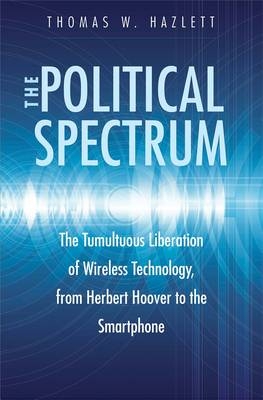
The Political Spectrum
The Tumultuous Liberation of Wireless Technology, from Herbert Hoover to the Smartphone
Seiten
2017
Yale University Press (Verlag)
978-0-300-21050-7 (ISBN)
Yale University Press (Verlag)
978-0-300-21050-7 (ISBN)
- Titel ist leider vergriffen;
keine Neuauflage - Artikel merken
From the former chief economist of the FCC, a remarkable history of the U.S. government's regulation of the airwaves
From the former chief economist of the FCC, a remarkable history of the U.S. government’s regulation of the airwaves
Popular legend has it that before the Federal Radio Commission was established in 1927, the radio spectrum was in chaos, with broadcasting stations blasting powerful signals to drown out rivals. In this fascinating and entertaining history, Thomas Winslow Hazlett, a distinguished scholar in law and economics, debunks the idea that the U.S. government stepped in to impose necessary order. Instead, regulators blocked competition at the behest of incumbent interests and, for nearly a century, have suppressed innovation while quashing out-of-the-mainstream viewpoints.
Hazlett details how spectrum officials produced a “vast wasteland” that they publicly criticized but privately protected. The story twists and turns, as farsighted visionaries—and the march of science—rise to challenge the old regime. Over decades, reforms to liberate the radio spectrum have generated explosive progress, ushering in the “smartphone revolution,” ubiquitous social media, and the amazing wireless world now emerging. Still, the author argues, the battle is not even half won.
From the former chief economist of the FCC, a remarkable history of the U.S. government’s regulation of the airwaves
Popular legend has it that before the Federal Radio Commission was established in 1927, the radio spectrum was in chaos, with broadcasting stations blasting powerful signals to drown out rivals. In this fascinating and entertaining history, Thomas Winslow Hazlett, a distinguished scholar in law and economics, debunks the idea that the U.S. government stepped in to impose necessary order. Instead, regulators blocked competition at the behest of incumbent interests and, for nearly a century, have suppressed innovation while quashing out-of-the-mainstream viewpoints.
Hazlett details how spectrum officials produced a “vast wasteland” that they publicly criticized but privately protected. The story twists and turns, as farsighted visionaries—and the march of science—rise to challenge the old regime. Over decades, reforms to liberate the radio spectrum have generated explosive progress, ushering in the “smartphone revolution,” ubiquitous social media, and the amazing wireless world now emerging. Still, the author argues, the battle is not even half won.
Thomas Winslow Hazlett holds the H. H. Macaulay Endowed Professorship in Economics at Clemson University, where he also directs the Information Economy Project.
| Erscheinungsdatum | 04.07.2017 |
|---|---|
| Zusatzinfo | 19 b-w illus. |
| Sprache | englisch |
| Maße | 156 x 235 mm |
| Gewicht | 744 g |
| Themenwelt | Geisteswissenschaften ► Geschichte ► Regional- / Ländergeschichte |
| Geschichte ► Teilgebiete der Geschichte ► Technikgeschichte | |
| Sozialwissenschaften ► Kommunikation / Medien ► Journalistik | |
| Sozialwissenschaften ► Politik / Verwaltung ► Staat / Verwaltung | |
| Technik ► Nachrichtentechnik | |
| Wirtschaft | |
| ISBN-10 | 0-300-21050-7 / 0300210507 |
| ISBN-13 | 978-0-300-21050-7 / 9780300210507 |
| Zustand | Neuware |
| Haben Sie eine Frage zum Produkt? |
Mehr entdecken
aus dem Bereich
aus dem Bereich
Buch | Softcover (2024)
Lehmanns Media (Verlag)
19,95 €
Vom Perceptron zum Deep Learning
Buch | Softcover (2022)
Springer Vieweg (Verlag)
19,99 €
Digitalisierung neu denken für eine gerechte Gesellschaft
Buch | Hardcover (2023)
Quadriga (Verlag)
20,00 €


